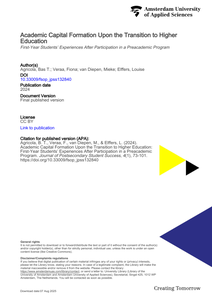The transition from secondary education to the first year of higher education is a phase in which students are faced with many challenges. First-year students may lack the academic capital that is needed to understand explicit and implicit rules of higher education. We investigated students’ participation in a preacademic program and the development of their academic capital. In a mixed method study, we showed that first-year students who participated in a preacademic program perceived peer mentors and teachers to be relevant sources of information, learned how to overcome educational barriers, and became more acquainted with explicit and implicit college requirements.
LINK
The transition from secondary education to the first year of higher education is a phase in which students are faced with many challenges. First-year students may lack the academic capital that is needed to understand explicit and implicit rules of higher education. We investigated students’ participation in a preacademic program and the development of their academic capital. In a mixed method study, we showed that first-year students who participated in a preacademic program perceived peer mentors and teachers to be relevant sources of information, learned how to overcome educational barriers, and became more acquainted with explicit and implicit college requirements.
DOCUMENT

Dit artikel gaat in op en reflecteert op de dissertatie En wat kan ik dan later worden? (Slijper, 2017). Het betreft een longitudinaal onderzoek naar het studiekeuzeproces van 89 studenten HBO-Rechten en Sociaal Juridische Dienstverlening, en de betekenis daarvan voor studiesucces.
DOCUMENT

Energy transition is key to achieving a sustainable future. In this transition, an often neglected pillar is raising awareness and educating youth on the benefits, complexities, and urgency of renewable energy supply and energy efficiency. The Master Energy for Society, and particularly the course “Society in Transition”, aims at providing a first overview on the urgency and complexities of the energy transition. However, educating on the energy transition brings challenges: it is a complex topic to understand for students, especially when they have diverse backgrounds. In the last years we have seen a growing interest in the use of gamification approaches in higher institutions. While most practices have been related to digital gaming approaches, there is a new trend: escape rooms. The intended output and proposed innovation is therefore the development and application of an escape room on energy transition to increase knowledge and raise motivation among our students by addressing both hard and soft skills in an innovative and original way. This project is interdisciplinary, multi-disciplinary and transdisciplinary due to the complexity of the topic; it consists of three different stages, including evaluation, and requires the involvement of students and colleagues from the master program. We are confident that this proposed innovation can lead to an improvement, based on relevant literature and previous experiences in other institutions, and has the potential to be successfully implemented in other higher education institutions in The Netherlands.
The project’s aim is to foster resilient learning environments, lessen early school leaving, and give European children (ages 4 -6) a good start in their education while providing and advancing technical skills in working with technology that will serve them well in life. For this purpose, the partnership has developed age appropriate ICT animation tools and games - as well as pedagogical framework specific to the transition phase from kindergarten to school.
The European creative visual industry is undergoing rapid technological development, demanding solid initiatives to maintain a competitive position in the marketplace. AVENUE, a pan-European network of Centres of Vocational Excellence, addresses this need through a collaboration of five independent significant ecosystems, each with a smart specialisation. AVENUE will conduct qualified industry-relevant research to assess, analyse, and conclude on the immediate need for professional training and educational development. The primary objective of AVENUE is to present opportunities for immediate professional and vocational training, while innovating teaching and learning methods in formal education, to empower students and professionals in content creation, entrepreneurship, and innovation, while supporting sustainability and healthy working environments. AVENUE will result in a systematised upgrade of workforce to address the demand for new skills arising from rapid technological development. Additionally, it will transform the formal education within the five participating VETs, making them able to transition from traditional artistic education to delivering skills, mindsets and technological competencies demanded by a commercial market. AVENUE facilitates mobility, networking and introduces a wide range of training formats that enable effective training within and across the five ecosystems. A significant portion of the online training is Open Access, allowing professionals from across Europe to upgrade their skills in various processes and disciplines. The result of AVENUE will be a deep-rooted partnership between five strong ecosystems, collaborating to elevate the European industry. More than 2000 professionals, employees, students, and young talents will benefit from relevant and immediate upgrading of competencies and skills, ensuring that the five European ecosystems remain at the forefront of innovation and competitiveness in the creative visual industry.